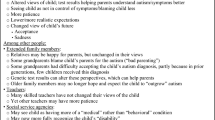Abstract
A diagnosis of Huntington’s disease has broad social, vocational, reproductive and psychological implications. The ability to accurately diagnose the illness via genetic testing is not new. However, given a persistent lack of robustly effective interventions, it remains an area of ethical concern. The difficulty is compounded in cases of intellectual disability. This paper presents a case of genetic testing for Huntington’s disease conducted on a patient with intellectual disability with guardian consent, but without the patient’s direct knowledge and how the family illness narrative and psychiatric care were employed in the eventual disclosure of the patient’s diagnosis and subsequent management.
Similar content being viewed by others
References
Ahmed T, Raza SH, Maryam A, Setzer W, Braidy N, Nabavi SF, et al. (2016, Epub ahead of print). Ginsenoside Rb1 as neuroprotective agent: a review. Brain Research Bulletin.
Committee on Bioethics, Committee on Genetics, and, The American College of Medical Genetics and, Genomics Social, Ethical, and Legal Issues Committee (2013). Ethical and Policy Issues in Genetic Testing and Screening of Children. Pediatrics, 131, 620–622.
Dobson, L., Träger, U., Farmer, R., Hayardeny, L., Loupe, P., Hayden, M. R., et al. (2016). Laquinimod dampens hyperactive cytokine production in Huntington’s disease patient myeloid cells. Journal of Neurochemistry, 137, 782–794.
Jia, H., Wang, Y., Morris, C. D., Jacques, V., Gottesfeld, J. M., Rusche, J. R., et al. (2016). The effects of pharmacological inhibition of histone deacetylase 3 (HDAC3) in Huntington’s disease mice. PloS One, 11, e0152498.
Killoran, A., & Biglan, K. M. (2014). Current therapeutic options for Huntington’s disease: good clinical practice versus evidence-based approaches? Movement Disorders, 29, 1404–1413.
Rhodes, R. (2006). Why test children for adult-onset genetic diseases? Mount Sinai Journal of Medicine, 73, 609–616.
Ross, L. F., Saal, H. M., David, K. L., & Anderson, R. R. (2013). Technical report: ethical and policy issues in genetic testing and screening of children. Genetics in Medicine, 15, 234–245.
Ross, C. A., Aylward, E. H., Wild, E. J., Langbehn, D. R., Long, J. D., Warner, J. H., et al. (2014). Huntington disease: natural history, biomarkers and prospects for therapeutics. Nature Reviews Neurology, 10, 204–216.
Scully, J. L., Porz, R., & Rehmann-Sutter, C. (2007). You don’t make genetic test decisions from one day to the next’--using time to preserve moral space. Bioethics, 21, 208–217.
The Huntington’s Disease Collaborative Research Group. (1993). A novel gene containing a trinucleotide repeat that is expanded and unstable on Huntington’s disease chromosomes. Cell, 72, 971–983.
Walker, F. O. (2007). Huntington’s disease. Lancet, 369, 218–228.
Werner-Lin, A., & Gardner, D. S. (2009). Family illness narratives of inherited cancer risk: continuity and transformation. Families, Systems and Health, 27, 201–212.
Author information
Authors and Affiliations
Corresponding author
Ethics declarations
Disclosures
Some details of this case have been changed to protect the patient’s identity.
Conflict of Interest
Mark B. Warren and Kathryn M. Schak declare that they have no conflict of interest.
Ethical Approval
For this type of study formal consent is not required.
Animal Studies
No animal studies were carried out by the authors for this article.
Rights and permissions
About this article
Cite this article
Warren, M.B., Schak, K.M. Disclosing Huntington’s Genetic Testing Results in the Context of Intellectual Disability and Guardianship: Using the Family Illness Narrative to Guide the Flow of Information. J Genet Counsel 26, 272–275 (2017). https://doi.org/10.1007/s10897-016-0007-1
Received:
Accepted:
Published:
Issue Date:
DOI: https://doi.org/10.1007/s10897-016-0007-1




